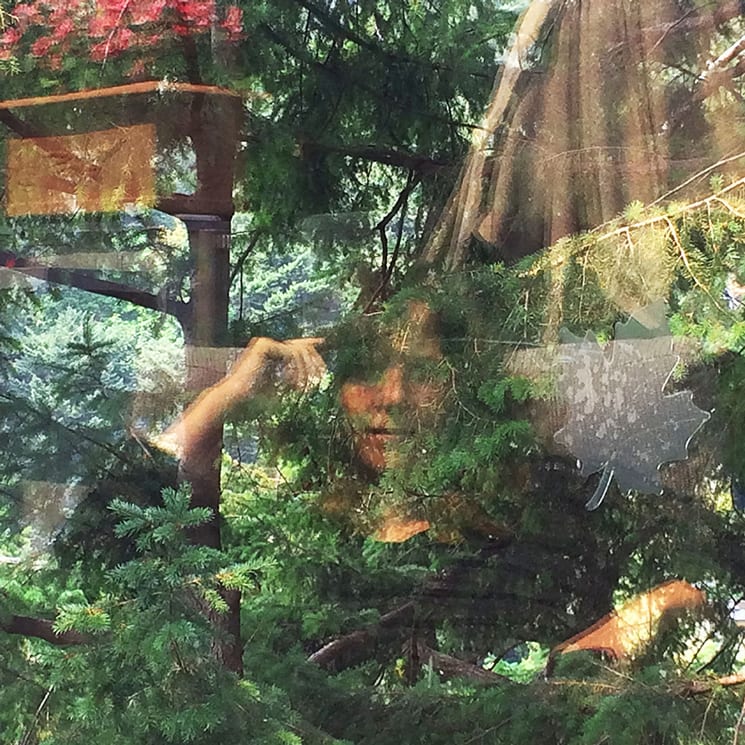Jennifer Castle recorded the first half of Angels of Death — her fifth album and followup to her Polaris Music Prize-shortlisted Pink City — with a live band at Dexter Sound, a church on the shores of Lake Erie. Though they were recording near Castle's new home in Port Stanley, ON, the musicians were from her Toronto music community, including guitarist Paul Mortimer (The Highest Order) and pianist Jonathan Adjemian. (She finished the record in Toronto, at her longtime producer Jeff McMurrich's studio.)
Angels of Death is a stark contemplation of death as experienced by the living, but it's also a meditation on writing, legacy and the defiance tangled up in the "majesty of turning / flesh into the storyline," as Castle sings on hushed, fingerpicked "Grim Reaper."
Castle tackles these songs about writing, singing and grief different ways, twice reprising "We Always Change," from her 2008 album You Can't Take Anyone, at the end of each vinyl side, with string arrangements by Mike Smith, who also played bass. These spacious interludes sound appropriately requiem-like and are part of why it is surprising that this deep, traversing album is only 35 minutes long.
Angels of Death begins and almost ends with songs referencing highways: on "Tomorrow's Mourning," the narrator is driving through wet weather on the expressway, moving and stuck at the same time the way that on "Tonight the Evening" the narrator is at home with a hand on the radio and a mind to the highway.
Country soul torch song "Crying Shame" may be the most universally relatable, straightforwardly structured song Castle has ever written, made more empathetic by gospel backup vocals that seem to help exorcise frustration, pain, heartbreak and loneliness.
If "Crying Shame" is simple, "Texas" sounds effortlessly complex, in the way that Castle's best songs have lines that lead inevitably (but not predictably) to one another. In it, Castle sings to Orion (the constellation), her father "who's been gone so very long," and to her dog Ribbon, who was killed by a car two years ago. It's weighted by mortality, but also contains levity and love, even humour, all bolstered by girl group-style "ooh"s.
One of the most rollicking, shimmery songs on Angels of Death is the title track, which borrows the second half of its lyrics from an Al Purdy poem. It's a surprisingly celebratory moment, when Castle repeats Purdy's line at the end, "as the seed imagines the flower." The song transitions from being about hard times to being about regeneration.
"Rose Waterfalls" is a lighthearted Great Speckled Bird-style romp that offers the band another opportunity to rip while Castle ruminates on the joys and liabilities of an active imagination. Rose Waterfalls is not autobiographical, Castle says, but a character through which to talk about switching back and forth between normal life and writing. In the end, Rose Waterfalls' chameleonic two names ("one name for the world / when it needs my blood and sweat / and one name for the muses when they're calling") are just another example of all the change, metamorphosis, turning and movement of the record.
(Idée Fixe)Angels of Death is a stark contemplation of death as experienced by the living, but it's also a meditation on writing, legacy and the defiance tangled up in the "majesty of turning / flesh into the storyline," as Castle sings on hushed, fingerpicked "Grim Reaper."
Castle tackles these songs about writing, singing and grief different ways, twice reprising "We Always Change," from her 2008 album You Can't Take Anyone, at the end of each vinyl side, with string arrangements by Mike Smith, who also played bass. These spacious interludes sound appropriately requiem-like and are part of why it is surprising that this deep, traversing album is only 35 minutes long.
Angels of Death begins and almost ends with songs referencing highways: on "Tomorrow's Mourning," the narrator is driving through wet weather on the expressway, moving and stuck at the same time the way that on "Tonight the Evening" the narrator is at home with a hand on the radio and a mind to the highway.
Country soul torch song "Crying Shame" may be the most universally relatable, straightforwardly structured song Castle has ever written, made more empathetic by gospel backup vocals that seem to help exorcise frustration, pain, heartbreak and loneliness.
If "Crying Shame" is simple, "Texas" sounds effortlessly complex, in the way that Castle's best songs have lines that lead inevitably (but not predictably) to one another. In it, Castle sings to Orion (the constellation), her father "who's been gone so very long," and to her dog Ribbon, who was killed by a car two years ago. It's weighted by mortality, but also contains levity and love, even humour, all bolstered by girl group-style "ooh"s.
One of the most rollicking, shimmery songs on Angels of Death is the title track, which borrows the second half of its lyrics from an Al Purdy poem. It's a surprisingly celebratory moment, when Castle repeats Purdy's line at the end, "as the seed imagines the flower." The song transitions from being about hard times to being about regeneration.
"Rose Waterfalls" is a lighthearted Great Speckled Bird-style romp that offers the band another opportunity to rip while Castle ruminates on the joys and liabilities of an active imagination. Rose Waterfalls is not autobiographical, Castle says, but a character through which to talk about switching back and forth between normal life and writing. In the end, Rose Waterfalls' chameleonic two names ("one name for the world / when it needs my blood and sweat / and one name for the muses when they're calling") are just another example of all the change, metamorphosis, turning and movement of the record.
